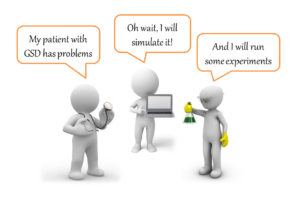Project
Polymers in the Liver: Metabolism and Regulation
Metabolic diseases are a burden on the European population and health care system. It is increasingly recognised that individual differences with respect to history, lifestyle, and genetic make-up affect disease progression and treatment response. A Systems Medicine approach, based on computational models fed with individual patient data, has the potential to provide the basis for a personalised diagnosis and treatment strategy. The PoLiMeR consortium (Polymers in the Liver: Metabolism and Regulation) has identified the inherited, liver-related diseases of glycogen and lipid metabolism as the ideal starting point for innovative research training in personalised ‘Systems Medicine’. These diseases are life-threatening for children. Since each specific disease is rare, research efforts are diluted. Our system-based perspective opens possibilities for the application of novel drugs and diagnostic tools to a range of different diseases.

Training program
To advance diagnostics and treatment of metabolic diseases beyond the state-of-the-art, a new generation of scientists is needed. The complexity of the metabolic network and its aberrant behaviour in disease require truly interdisciplinary researchers, trained in the three ‘pillars of Systems Medicine’: experimental, computational and clinical research. PoLiMeR aims to train talented PhD students in this field. We bring together clinical, academic, and industrial experts on inherited metabolic diseases, computational modelling of the entire human metabolism, organ-on-chip technology, and detailed metabolic profiling, located in Germany, Ireland, Sweden, Norway, United Kingdom, Austria and the Netherlands. Our mission is to train our PhD students to become dedicated Systems-Medicine experts, who can seamlessly collaborate between computational and wet-lab environments, and between clinical, academic, and industrial environments. This training will enable them to become the future leaders in the field and eventually make the difference for the patients.
3-Minutes Presentations about the Challenges in PoLiMeR
Challenge 1
Challenge 2
Challenge 3 & 5
Challenge 4
Go to the PhD projects
![]()